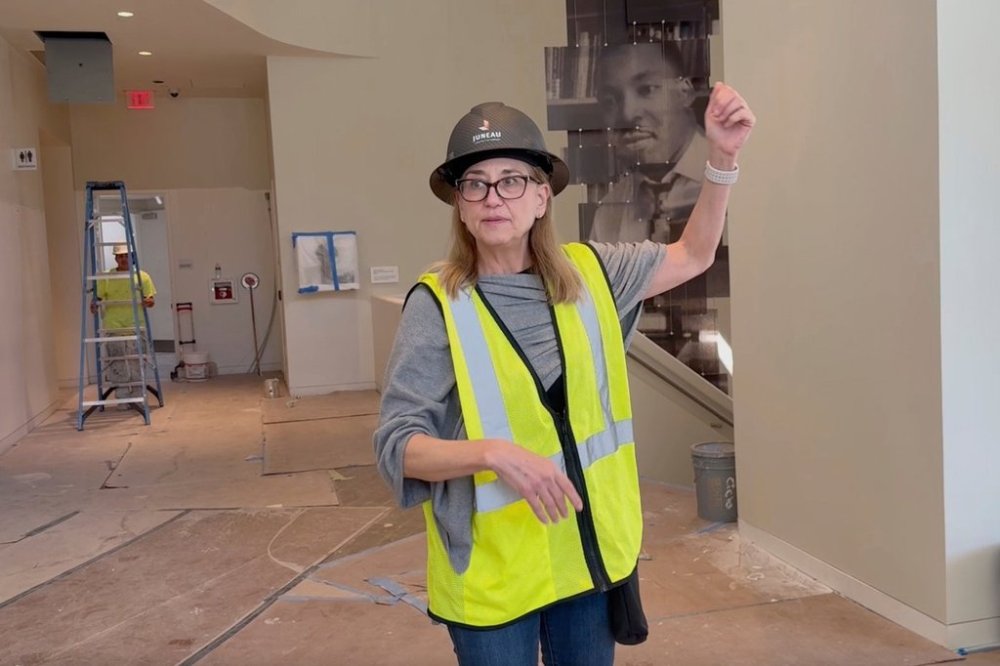World
National Center for Civil and Human Rights Expands Amid Cultural Shift

The National Center for Civil and Human Rights in Atlanta is set to undergo a significant expansion, marking a pivotal moment in the discourse surrounding civil rights education in the United States. The expansion, which has cost nearly $60 million, will introduce six new galleries along with classrooms and interactive experiences, transforming the museum into a vibrant hub for advocacy and education. The center is scheduled to reopen on November 8, 2023, following months of renovations.
Unlike institutions under government funding, such as the Smithsonian, the National Center operates independently, allowing it to sidestep potential restrictions on educational content. According to the center’s president and CEO, Jill Savitt, the aim is to inspire visitors to actively engage in civil rights advocacy. “We want people to take action supporting civil and human rights, racial justice, and the future of democracy,” Savitt stated.
Engaging the Next Generation
The center has remained active during the renovation period, offering over 300 online lesson plans for K-12 education, a LGBTQ+ Institute, and human rights training for various sectors, including law enforcement. These initiatives reflect the ongoing challenges to the narratives upheld by the current political climate.
The museum was founded in 2014 by civil rights leaders Evelyn Lowery and Andrew Young, situated on land donated by the Coca-Cola Company. Following a decline in ticket sales during the pandemic, the center hopes to attract repeat visitors with new immersive experiences. One of these is the upcoming “Change Agent Adventure,” designed for children under 12, which encourages them to pledge small acts of kindness and justice.
“I think advocacy and change-making is kind of addictive. When you see the success of your actions, you want to do more,” Savitt explained. This initiative aims to cultivate a sense of agency among children, countering the notion that young people should be sheltered from difficult truths.
Exhibits That Challenge and Inspire
The expansion will also debut the exhibit “Broken Promises” in December, which focuses on the post-Civil War Reconstruction era. This period faced violent backlash against progress made by formerly enslaved people. Curator Kama Pierce emphasized the importance of understanding historical patterns of progress and regression: “We want to start orienting you in the conversation that we believe we all kind of see, but we don’t say it outright: Progress. Backlash.”
Among the artifacts displayed will be a bullet-riddled historical marker from the 1918 lynching of Mary Turner, donated by her descendants. The exhibit will also feature items from the Morehouse College Martin Luther King Jr. collection, including a recreation of King’s home office, enhanced by family photographs provided by his daughter, Rev. Bernice King.
The center’s new approach shifts away from focusing solely on historical atrocities and instead highlights human rights victories. Savitt noted that research indicates that portraying positive outcomes encourages active participation rather than apathy. “If you give people something to hope for that’s positive, you’re more likely to cultivate a sense of agency in people,” she stated.
In an innovative experience, visitors will engage in a simulated 1960s sit-in against segregation, complete with immersive audio of a hostile crowd. Following this intense experience, a designated reflection area will allow guests to contemplate their feelings and insights.
The funding for this extensive expansion has been supported by philanthropist and Home Depot co-founder Arthur M. Blank, alongside contributions from the Mellon Foundation and various other donors. Savitt expressed her gratitude to these supporters, who share concerns about the current understanding of citizenship and democracy. “Supporting the teaching of civil and human rights makes a good investment in the future of a vibrant, prosperous America,” she concluded.
As the National Center for Civil and Human Rights prepares for its reopening, it stands as a testament to the enduring struggle for justice and equality in the United States, aiming to engage and inspire future generations.
-

 World4 months ago
World4 months agoScientists Unearth Ancient Antarctic Ice to Unlock Climate Secrets
-

 Entertainment4 months ago
Entertainment4 months agoTrump and McCormick to Announce $70 Billion Energy Investments
-

 Lifestyle4 months ago
Lifestyle4 months agoTransLink Launches Food Truck Program to Boost Revenue in Vancouver
-

 Science4 months ago
Science4 months agoFour Astronauts Return to Earth After International Space Station Mission
-

 Technology2 months ago
Technology2 months agoApple Notes Enhances Functionality with Markdown Support in macOS 26
-

 Top Stories3 weeks ago
Top Stories3 weeks agoUrgent Update: Fatal Crash on Highway 99 Claims Life of Pitt Meadows Man
-

 Sports4 months ago
Sports4 months agoSearch Underway for Missing Hunter Amid Hokkaido Bear Emergency
-

 Politics3 months ago
Politics3 months agoUkrainian Tennis Star Elina Svitolina Faces Death Threats Online
-

 Politics4 months ago
Politics4 months agoCarney Engages First Nations Leaders at Development Law Summit
-

 Technology4 months ago
Technology4 months agoFrosthaven Launches Early Access on July 31, 2025
-

 Top Stories1 week ago
Top Stories1 week agoFamily Remembers Beverley Rowbotham 25 Years After Murder
-

 Entertainment4 months ago
Entertainment4 months agoCalgary Theatre Troupe Revives Magic at Winnipeg Fringe Festival





















